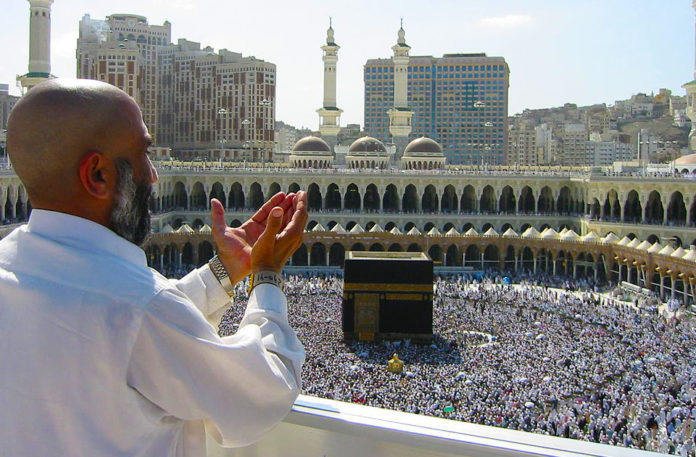Know, my fellow brother, that there are certain etiquettes to the Hajj, which one must abide by and adorn himself with, such as:
Maintain cleanliness in your clothes, your tent, the place where you stay, and in your food and drink. This is because keeping clean will aid in preserving your health and in repelling sicknesses.
Beware of dropping filth or spoiled food in the roads that people use, for it will cause those performing Hajj to be bothered, and it will cause diseases to spread. So one must remove harmful objects from the road and put them in their proper place (i.e. garbage).
Bear the harm that comes from your neighbors with patience, and do not (let that cause you to) harm any of your brothers. Instead, repel their harm in a manner that is better, such as by using kind words.
Avoid sexual relations, committing sins, arguing and debating with falsehood, so that your Hajj can be accepted. Listen to the words of Allah:
| So whoever intends to perform Hajj therein (in the months of Hajj), then he must NOT have sexual relations, nor commit sin, nor debate unjustly during Hajj. [Surah Al-Baqarah: 197] |
And the Prophet (saws) said:
| Whoever goes to Hajj and he does not have sexual relations in it nor does he commit sin, he returns back (from Hajj) like the day when his mother gave birth to him (i.e. free from sins). [Reported by Al-Bukhari and Muslim] |
Be lenient in your buying and selling, and show good manners. And do not deal with anyone in a manner that he is not pleased with.
Beware of smoking, displaying bad manners and insulting others, for reviling a Muslim is sinfulness and fighting against him is disbelief.
Do not waste your time in the market places buying and selling or in gossiping with the he said/she said talk.
Be gentle with those around you when performing Tawaaf, kissing the Stone, the Saee, and when throwing the stones (Ramee) and so on. This is from the gentleness that is required, for Allahs Messenger (saws) said:
| Whoever is deprived of gentleness, he is deprived of all kinds of good. [Reported in Saheeh Muslim] |
Do not raise your voice out loud when making duaa (supplication) during Tawaaf, because it disturbs the others making Tawaaf.
Do not push and shove people, especially when kissing the Black Stone. If it is too crowded and there is too much shoving, it is enough for you to just point in its direction. And when casting the stones (Ramee), it is not permissible for you to use large stones, because this has been forbidden in the religious texts and because it will cause harm to those standing (in front of you). Also, do not throw your shoes (instead of rocks) as some ignorant people do for this is a reprehensible act! Avoid touching the glass surrounding the Prophets grave, and avoid touching the walls of the Kaabah. Rather what is to be touched and kissed from it is (only) the Black Stone. The Yemeni Corner is also touched. [1]
You must shave your head or cut your hair very short when in the state of Hill (out of Ihraam), but beware of shaving the beard off, for that is forbidden according to the unanimous agreement of the scholars. Allah says:
| with (the hair on) their heads shaven or cut short |
Allahs Messenger (saws) said:
| Trim the moustaches and leave the beards to grow Do the opposite of the Majoos. {Reported by Muslim] |
Beware of supplicating and calling out to other than Allah, such as calling to deceased people or others not present. This is from the types of Shirk that Allah has forbidden in His saying:
| And do not call besides Allah that which can neither bring you benefit nor cause you harm. If you do that, then you will be from the wrong-doers. |
What is meant by wrong-doers in this ayah are the polytheists (those who commit shirk). If a Muslim commits Shirk, his good deeds become nullified and his Hajj is lost, as Allah says:
| And if you commit Shirk, We will surely cancel out your good deeds and you will indeed be from the losers. [Surah Az-Zumar: 65] |
Beware of Riyaa, which is doing a deed for the sake of being seen or heard. An example of this when someone goes to Hajj so that it can be said of him Hajji so and so. The title Hajji (or Al-Hajj in Arabic) was not a term that was known to the righteous predecessors (Salaf as-Saalih), so we cannot hear from any of them that he said about his brother Hajji so and so. Rather, this is from the innovations of those in recent times. So have sincerity in your Hajj and say as Allahs Messenger (saws) said:
| O Allah, (this is) a Hajj with no riyaa or samah in it. [2] |
Increase in your recitation of the Quraan and acting on what is in it, your performing of Tawaaf, your sending of Salaat on the Prophet. And make a lot of supplication, especially at night, because Allahs Messenger (saws) said:
| Whoever wakes in the night and says when he awakens: Laa Ilaaha IllAllah wahdahu laa shareeka lahu. Lahul-Mulk wa lahul-Hamd wa Huwa alaa Kulli shayin Qadeer. SubhaanAllah wal-Hamdu Lillaah wa Laa Ilaaha IllAllah wa-Allahu Akbar wa laa Hawla wa laa Quwata Illaa Billaah.[3] |
And then he says:
| Allahumma Ighfir Lee or some supplication, he will be answered. And if he makes ablution and prays, his prayer will be accepted. [Saheeh Al-Bukhari] |
Footnotes:
[1] Translators Note: The Prophet (saws) said: Touching the Black Stone and the Yemeni Corner removes sins. [Reported by At-Timrimidhee and Ibn Khuzaimah and authenticated by Al-Albaanee in his book on Hajj.
[2] Translators Note: Riyaa means doing deeds to be seen and Samah means doing deeds to be heard.
[3] Translators Note: This means: There is no deity worthy of worship except Allah alone and with no partner. To Him belongs the Dominion and the Praise and He is Able over all things. Glory be to Allah, all praise be to Allah, and there is no deity worthy of worship except Allah. And there is no movement nor power except by Allahs permission. The next phrase means: O Allah, forgive me.
| |























MashaAllah! nice step by step hajj guide to perform
Great post. Hajj is the wonderful pilgrimage and holy place. So, need discipline while performing Hajj. When we get good Hajj Packages, It will be wonderful.
Thanks, admin for the post this type of content, This is very appreciated and good Guidelines about the Performing Hajj.